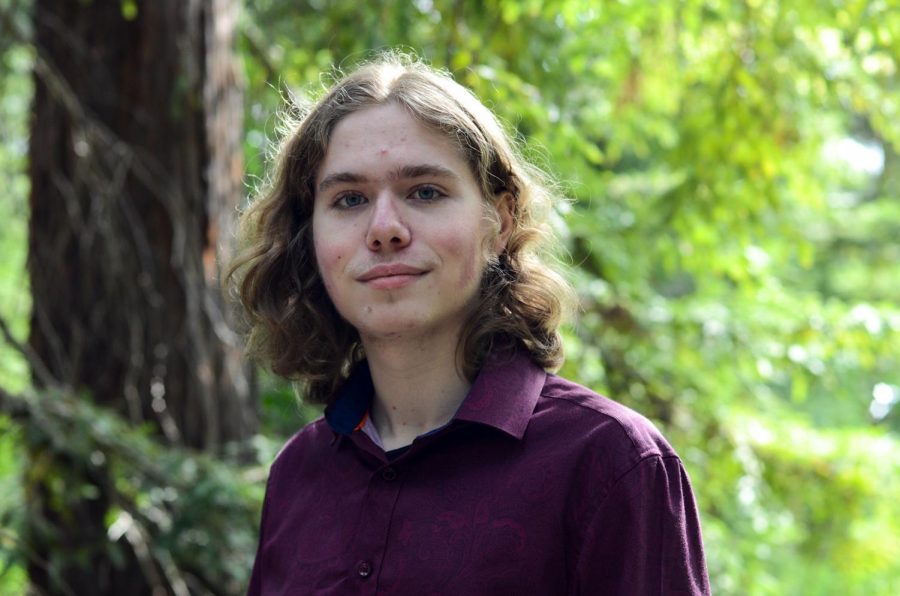Humans of Harker: Questions and curiosity
Jack Pearce (12) ponders the abstractness of life
“We sort of tend almost intrinsically, to strive for whatever we can using whatever methods available. And this often results in a lot of shortcuts or assumptions. The thing that might help you find what might matter the most to you, ultimately, is how much you work on understanding yourself and what’s around you. Because that knowledge, or that perspective, is something that you’re going to carry with you for your whole life,” Jack Pearce (12) said.
The bright morning sun peeks through the dark green redwood trees standing tall. Jack Pearce (12) observes his surroundings, listening to the quiet sounds of early spring and intently scanning the natural beauty of Redwood Grove Nature Preserve in Los Altos, CA.
Jack fell in love with nature after participating in Grassroots Ecology, an organization that is dedicated to restoring nature preserves across the Bay Area. He volunteered with them in the Summer Stewards program throughout high school and became interested in volunteer work when he decided to refrain from competitive activities.
“Formalized competition within a set structure doesn’t seem very useful, because almost nothing within the real world is going to end up looking like that,” Jack said. “I think that the ability to think for yourself and make educated structures of knowledge from whatever you have available is much more important than the ability to perform better in a certain area.”
Because Jack stayed away from big clubs and activities, he had a significant amount of free time. He watched his peers become involved in activities but worried that he would not grow as a result of his decision.
“For a while I was worried [that] if I’m not [active in clubs], then I’m not really engaging with everything around me and I’m not going to grow as a person,” Jack said. “I am somewhat surprised that I ended up progressing and maturing regardless of that.”
Instead of focusing on competitive activities, Jack used his free time to explore and developed a passion in philosophy. He found that he had more time to spend inside the classroom, and dove deeper into learning by asking abstract questions.
“I ask a lot of questions, and I’m pretty involved with more generalized questions,” Jack said. “Mr. Pistacchi, the other day, after I had attended the Ethics and Technology conference, introduced me to some of the speakers as ‘our resting philosopher.’”
Jack’s fondness for philosophy branches out from his broader love of learning. Instead of focusing on the grade of an assignment, Jack prioritizes the learning aspect. He works with his teachers to go beyond the assignment that he is given and to find out the true meaning of topics.
“There’s a lot here at Harker that you can attempt to do within the classroom setting that takes up a lot of time and energy. I get to put the finishing touches on things from my own understanding on top of having to worry about grades, because I have the time to do so,” Jack said.
Harker’s prolific resources and talented teachers gave Jack the opportunity to dive deeper into learning and fulfill his curiosity. Jack made an effort to converse with his teachers on his own time to further his understanding of topics learned in class. He gained extra knowledge from taking advantage of Harker’s accomplished faculty, and would like others to do the same.
“I want people to look to me as an example of how you can use the opportunities here for a process of self enrichment rather than simply the attainment of books,” said Jack. “I really would like people to take an approach to learning and interact with teachers because there is so much blatant potential in all of the people that we have here as faculty.”
Jack often converses with upper school economics teacher Sam Lepler, who taught Jack for two years and noticed Jack’s active and engaging personality.
“[Jack] was always a ravenously curious kid, but I’ve seen that grow even more,” Lepler said. “He is really into applying [concepts to] real life, even taking actions of his own based on what he learns.”
Jack transfers his curiosity onto paper to document his unique ideas and expresses himself through his writing, whether it is an academic paper or through dialogue. He remains proud of one piece in particular, in which he inserted poet Robert Frost’s “The Secret.”
“I have a series of essays that I thought did a good job of both self expression and literary engagement. I actually managed to fit in a poem into one of them: an entire essay structured around a poem, using the poem as an analogy for the message I was trying to convey,” Jack said.
Jack developed this idea both from his own curiosity and with inspiration from his teachers after having difficulty choosing a topic to write about. He eventually connected with the poem as a way to accurately express himself.
One of Jack’s friends, Christine Tang (12), commented on her personal experience with Jack’s curious personality.
“If he sees that someone is interested in something, he actually tries to figure out why they’re interested, which is not really a common trait [and] is a really good part of him,” Christine said.
While Jack worried about finding his true passion, he realized that reflecting on one’s actions is the best way to move forward. Jack eventually discovered philosophy through his love of learning, which will stay with him forever as he moves on throughout life.
“We sort of tend almost intrinsically, to strive for whatever we can using whatever methods available. And this often results in a lot of shortcuts or assumptions. The thing that might help you find what might matter the most to you, ultimately, is how much you work on understanding yourself and what’s around you. Because that knowledge, or that perspective, is something that you’re going to carry with you for your whole life,” Jack said.

Anika Mani (12) is the co-editor-in-chief of the TALON Yearbook, and this is her third year on staff. She enjoys traveling the world, trying out new restaurants...

Esha Gohil (12) is the co-editor-in-chief of Humans of Harker and the photo editor of Harker Aquila. This is her fourth year on staff, and this year she...


















![“[Building nerf blasters] became this outlet of creativity for me that hasn't been matched by anything else. The process [of] making a build complete to your desire is such a painstakingly difficult process, but I've had to learn from [the skills needed from] soldering to proper painting. There's so many different options for everything, if you think about it, it exists. The best part is [that] if it doesn't exist, you can build it yourself," Ishaan Parate said.](https://harkeraquila.com/wp-content/uploads/2022/08/DSC_8149-900x604.jpg)




![“When I came into high school, I was ready to be a follower. But DECA was a game changer for me. It helped me overcome my fear of public speaking, and it's played such a major role in who I've become today. To be able to successfully lead a chapter of 150 students, an officer team and be one of the upperclassmen I once really admired is something I'm [really] proud of,” Anvitha Tummala ('21) said.](https://harkeraquila.com/wp-content/uploads/2021/07/Screen-Shot-2021-07-25-at-9.50.05-AM-900x594.png)







![“I think getting up in the morning and having a sense of purpose [is exciting]. I think without a certain amount of drive, life is kind of obsolete and mundane, and I think having that every single day is what makes each day unique and kind of makes life exciting,” Neymika Jain (12) said.](https://harkeraquila.com/wp-content/uploads/2017/06/Screen-Shot-2017-06-03-at-4.54.16-PM.png)








![“My slogan is ‘slow feet, don’t eat, and I’m hungry.’ You need to run fast to get where you are–you aren't going to get those championships if you aren't fast,” Angel Cervantes (12) said. “I want to do well in school on my tests and in track and win championships for my team. I live by that, [and] I can do that anywhere: in the classroom or on the field.”](https://harkeraquila.com/wp-content/uploads/2018/06/DSC5146-900x601.jpg)
![“[Volleyball has] taught me how to fall correctly, and another thing it taught is that you don’t have to be the best at something to be good at it. If you just hit the ball in a smart way, then it still scores points and you’re good at it. You could be a background player and still make a much bigger impact on the team than you would think,” Anya Gert (’20) said.](https://harkeraquila.com/wp-content/uploads/2020/06/AnnaGert_JinTuan_HoHPhotoEdited-600x900.jpeg)

![“I'm not nearly there yet, but [my confidence has] definitely been getting better since I was pretty shy and timid coming into Harker my freshman year. I know that there's a lot of people that are really confident in what they do, and I really admire them. Everyone's so driven and that has really pushed me to kind of try to find my own place in high school and be more confident,” Alyssa Huang (’20) said.](https://harkeraquila.com/wp-content/uploads/2020/06/AlyssaHuang_EmilyChen_HoHPhoto-900x749.jpeg)



